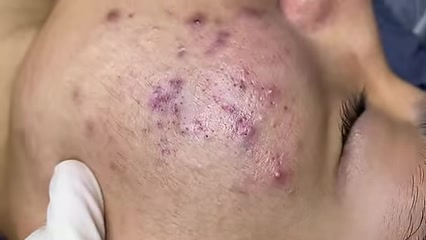Click Button Play To Watch Full Video 👇👇
What Your Acne Means by Location According to a Dermatologist
Acne is a multifaceted skin condition that affects millions globally. While it’s often seen as a cosmetic concern, the location of acne can provide significant insights into underlying health issues, lifestyle factors, and hormonal changes. Dermatologists frequently emphasize that understanding these patterns can help individuals address the root causes of their breakouts more effectively.
Forehead: Stress and Digestive Health
Acne on the forehead is commonly associated with stress and gastrointestinal issues. This area is linked to the digestive system, so breakouts here may indicate problems such as poor digestion or an unhealthy diet. High intake of processed foods or sugar can exacerbate acne. Stress is another key player, as it can trigger hormonal fluctuations that lead to increased oil production. Dermatologists often recommend dietary changes, such as incorporating more fiber and whole foods, along with stress management techniques like yoga or mindfulness practices to help reduce breakouts in this area.
T-Zone: Hormonal Fluctuations
The T-zone—comprising the forehead, nose, and chin—is notorious for being oily and prone to acne. Breakouts in this region often signal hormonal fluctuations, especially during puberty, menstruation, or pregnancy. Conditions like polycystic ovary syndrome (PCOS) can also contribute to increased oil production. Dermatologists typically suggest treatments aimed at regulating hormones, such as topical retinoids, hormonal contraceptives, or anti-androgens. A consistent skincare regimen that includes exfoliation and oil-free products is crucial for managing T-zone acne effectively.
Cheeks: Allergies and Environmental Irritants
Acne on the cheeks can often point to allergies or environmental factors. This area is particularly susceptible to irritants like pollution, dust, and allergens, which can clog pores and cause inflammation. Dermatologists may recommend evaluating your skincare and makeup products for potential irritants and switching to non-comedogenic options. Regularly cleaning items that come into contact with your face, like pillowcases and phones, can also help mitigate breakouts. Additionally, maintaining good hygiene and a skincare routine tailored to sensitive skin can be beneficial.
Chin and Jawline: Hormonal Imbalances
Breakouts along the chin and jawline are frequently associated with hormonal imbalances, especially in women. These types of acne can be influenced by menstrual cycles, pregnancy, or conditions such as PCOS. Dermatologists often suggest hormonal therapies, such as birth control pills or anti-androgens, to help stabilize hormone levels. Topical treatments containing salicylic acid or benzoyl peroxide can also effectively target and reduce inflammation in this area.
Back and Shoulders: Lifestyle Factors
Body acne, particularly on the back and shoulders, is often linked to lifestyle choices. Tight clothing, excessive sweating, and inadequate hygiene can contribute to clogged pores. Dermatologists typically recommend using body washes with exfoliating ingredients and advising patients to shower promptly after sweating. Wearing breathable fabrics can also minimize body acne. Regular exfoliation can help keep the skin clear and prevent breakouts.
Neck: Stress and Hormonal Changes
Acne on the neck can reflect a combination of hormonal changes and stress. Similar to the chin and jawline, breakouts in this area may indicate hormonal fluctuations. Dermatologists might recommend stress-reducing techniques and a consistent skincare routine that includes gentle cleansing and exfoliation to manage neck acne effectively.
Conclusion: Understanding Acne Patterns
Recognizing the significance of acne location can empower individuals to take proactive steps toward clearer skin. While these patterns provide useful insights, consulting a dermatologist is essential for personalized care and treatment. By addressing both the visible symptoms and their underlying causes, individuals can work towards achieving healthier skin. Ultimately, understanding your acne not only helps in effective treatment but also enhances overall well-being, paving the way for improved confidence and quality of life.
